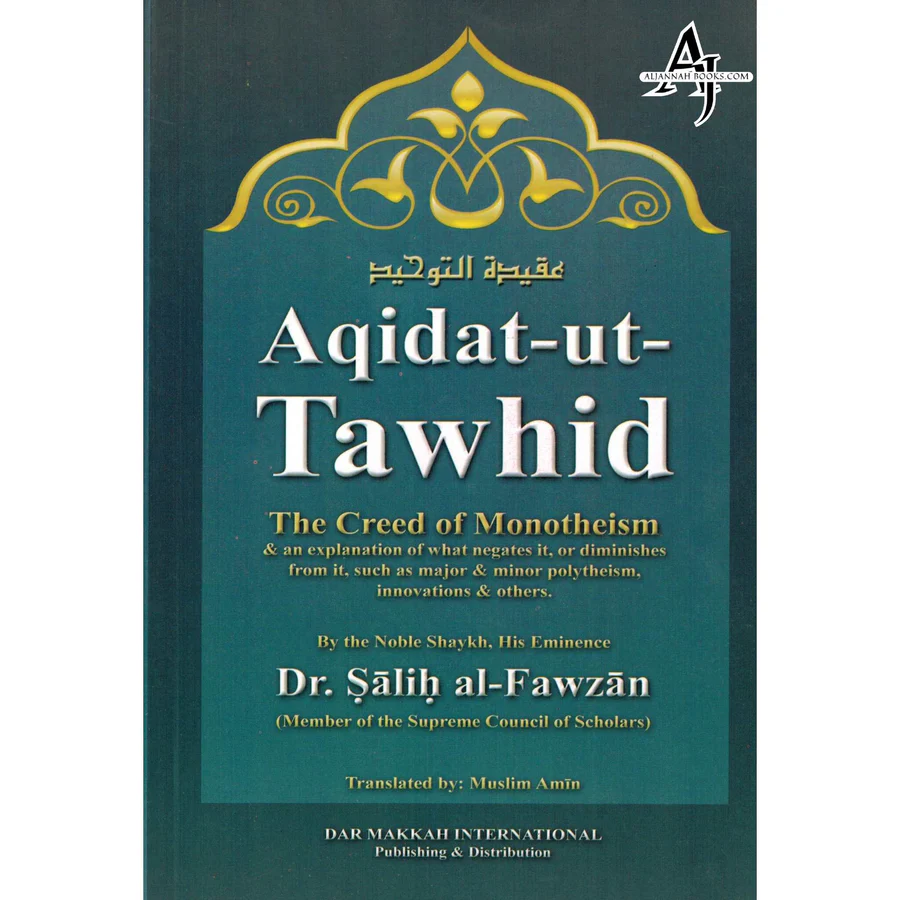The core belief of Islam is based on the concept of Tawhid, or monotheism. In Aqidat-Ur-Tawhid, Dr. Salih al-Fawzan delves deep into the Islamic doctrine of Tawhid to give an elaborative understanding of its importance in a Muslim’s life. Tawhid underlines the unity of Allah, the Creator, and forms the basis of any Muslim’s faith and practices. By clear explanation and concise insight, the reader is guided deeper by Dr. Salih al-Fawzan in the meaning of this fundamental concept.
The Meaning of Tawhid
The core of the faith of Islam is Tawhid. This is the declaration that there is no other deity except Allah; that is to say, no one is worthy of worship except Allah. Therefore, this concept distinguishes Islam from all other religions since it drives home the point of the oneness of Allah. Essentially, Tawhid means the recognition of Allah’s supremacy and singularity in everything.
The importance of this concept is explained further by Dr. Salih al-Fawzan. He divided this concept into three major categories: Tawhid ar-Rububiyyah, or oneness of Lordship; Tawhid al-Uluhiyyah, or oneness of worship; and Tawhid al-Asma wa-Sifat, or oneness of names and attributes. He said that each of them plays a very important role in how deeply one can go with Tawhid and how deeply it affects a Muslim’s world view.
The First Category of Tawhid: Oneness of Lordship
Tawhid ar-Rububiyyah is described to be the believe that Allah alone is the creator, sustainer and ruler of the entire universe. All things in existence, from the farthest galaxies down to the smallest atom, are at his control. This element of Tawhid recognizes Allah as the single provider and authority in the universe.
A paper by Dr. Salih al-Fawzan would remind people even to introspect regarding their surroundings’ creation. He stresses that the realization of Allah as the Lord over everything will make them realize His great might and wisdom. The contemplation of nature can reflect the evidence of Allah’s sovereignty in any living creature.
The Second Category of Tawhid: Oneness of Worship
Tawhid al-Uluhiyyah: one should worship Allah, and no other in his partnership. This is the most basic Tawhid of a Muslim’s life, as it means all performances – prayer, fasting, etc. – aim at Allah.
Dr. Salih al-Fawzan draws attention to the correctness of an act of worship. The fact that true worship is presented before Him-alone indeed manifests serious faith and authentic love. He is Exalted; the Quran srictly orders the Muslims: “And they were not commanded but to worship Allah, having made sure about Him”. This reveals that Allah alone deserves to be worshipped.
Third Category of Tawhid: Oneness of Names and Attributes
Tawhid al-Asma wa-Sifat focuses on the concepts concerning the perfect names and attributes of God. Names and attributes of God have been elaborated in the Quran and the Hadith. Such names represent God’s perfection and majesty and hence become important for Muslims to recognize and reiterate such names and attributes.
This context is explained by Dr. Salih al-Fawzan in terms of what the importance of the names and attributes of Allah is. When Allah’s people know and recognize the divine qualities, then they can have a better contact with Allah and understand what greatness inside means.
Impact of Tawhid in a Muslim’s Life
Tawhid is not some theological concept alone but equally important in the practical life of a Muslim. As Dr. Salih al-Fawzan says, proper understanding of Tawhid leads people to live life according to the instruction of Allah.
With the embracement of Tawhid, a Muslim becomes responsible and focused. He or she always sees to it that they are vigilant under Allah. For whatever little thing or even in every decision, they always know that it has its charge from Allah.
Tawhid and Shirk: Why It is Crucial Not to Practice Polytheism
Shirk is the antonym of Tawhid and is equivalent to associating any partners with Allah. Dr. Salih al-Fawzan reveals just how grave shirk is, stating it the most major sin in Islam, and in fact, the Prophet Muhammad (PBUH) warns that no sinner is graver than one committing shirk.
Shariah has explicitly and fully defined shirk as including many things. It can be in the form of idolatry, where Allah’s Oneness is given alongside other beings, or by raising anything or any one to a position meant only for Allah. For this reason, the concept of Tawhid among Muslims must then be understood and practiced in their own lives.
Role of Tawhid in Faith Upliftment
It enriches one’s faith because it constantly reminds a Muslim of how great Allah is. Discussing with Dr. Salih al-Fawzan on how tuning minds to develop Tawhid increases one’s reliance on Allah: “Trust in Allah brings stability even during calamity.”.
This also means that Tawhid is an encouragement to the Muslims towards al Illahi in time of need. Being sure that only He has the power, they appeal only to Him. This awareness keeps the Muslim close to Allah, and therefore, strengthens faith but deepens also a sense of security based on His care.
The Relationship Between Tawhid and Islamic Practice
This, in turn, has a direct impact upon a Muslim’s practice of Islam and will hence influence his life in performing. Acts of prayer, charity, and relations with others. According to Dr. Salih al-Fawzan, once he perceives the meaning of Tawhid, it inspires him to act in conformity with righteousness and justice by incorporating Allah’s commandments into all dimensions of life.
Tawhid also impacts how a Muslim relates to others. Since Allah is One, Muslims are reminded to act correctly before other beings: to deal with them in justice and kindness. This concept of justice is an essential element of the Muslim lifestyle and is cultivated through belief in the oneness of Allah.
Conclusion: The Primacy of Tawhid in Islam
In Aqidat-Ur-Tawhid, Dr. Salih al-Fawzan gives comprehensive knowledge of the idea of Tawhid. The book becomes a resource tool for anyone who wants to know the importance of monotheism in Islam. Dr. Salih al-Fawzan manages to explain the theological as well as the practical aspects of Tawhid. How one should live his life according to this deep belief.
It helps readers, reflecting on the teachings involved in this book. Develop the strength of their faith, cleanse their activities and get close to Allah. It is a source not only for intellectual enlightenment. But also spiritual direction, of immense inspiration and illumination. In every way for all Muslims at whatever stage of their path.
Tawhid in fact is the very foundation of the whole structure of Islam. Unless there is this foundation, a person cannot thoroughly live out the Islamic way of life. The depths of insights of the book Dr. Salih al-Fawzan has written on Tawhid is deep and penetrating enough to create awareness within people regarding this belief which is the most indispensable in Islam.
Conclusion
Our commitment to Tawhid should permeate every aspect of our lives as Muslims. Aqidat-Ur-Tawhid by Dr. Salih al-Fawzan reminds us that Tawhid or the oneness of Allah. Is not some mere theological concept but is, rather, the basis of faith. The ruling practice for how we live and interact with the world. True Tawhid is a journey of spiritual growth and self-realization-in being. So, one finds peace and fulfillment in life and in the Hereafter.
Now there’s a new blog on Aqidat-Ur-Tawhid, a definition of Tawhid, and how it sustains its characteristics within Islam. Applying the principles learned from this book, people can live in harmony with Allah’s way for them as a Muslim.
Read more: 50 Questions & Answers on Islamic Monotheism



